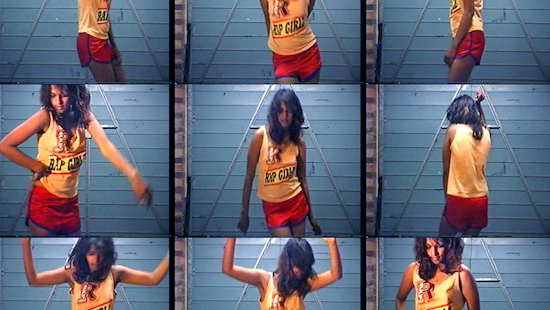As nationalism continues to rise over the UK, society is increasingly becoming volatile for second and third generation immigrants who are still struggling to grasp their sense of identity. Therefore it could not have been a more perfect time for Mathangi Arulpragasam, also known as the British Tamil recording artist M.I.A, to release her first biopic, Matangi/Maya/M.I.A. The film, directed by Steve Loveridge, whom she met while studying BA Fine Art at Central Saint Martins, reflects on three crucial stages of her life, starting as a refugee in the UK to her rise to fame as a cultural icon. Loveridge offers an in-depth look at where it all began.
As a young adult, M.I.A’s frustration to gain acceptance within her family, peers and society while also grappling to come to terms with her own identity is highly visible in the opening scenes of the film. Recording herself in a dark red-light room, she explains why her father Arul Pragasam is the root of all her misery and failure within her family. The short scene is symbolic as it epitomises the current state of mind for many refugee children currently facing difficulties adapting to new environments. Searching for answers and people to blame as they deal with anxiety and trauma seeking refuge. M.I.A naively calls her father a terrorist in the clip, overlooking how her father helped relocate and save thousands of Tamils around the world due to the Sri Lankan Civil War, regardless of his involvement as a political activist and founding member of the Eelam Revolutionary Organisation of Students in Sri Lanka. She famously quotes "get shot for being Tamil in Sri Lanka, get called a paki for being a Tamil in Britain."
Seeing past her difficulties as a young adult, M.I.A discovered she was very different from other Tamils, regularly expressing her emotions through creative mediums such as art, film and music, rather than following a more traditional academic route. The movie also follows her artistic journey as a multi-disciplinary artist, before her breakthrough debut album Arular in 2005. Her first taste for the music industry was through her then housemate Justine Frischmann.
In the early 90s, she was invited to film and document Britpop band Elastica. Following the group across the UK, she shot at festivals and backstage at concerts. It was at this moment in her life she realised she had a more significant purpose, urging the band to utilise their platform in a politically-minded way to evoke change. However, M.I.A still found herself as an outsider with the rest of the group, emotionally breaking down in front of the camera so she could go to sleep at night.
The constant reminders of being an outsider inspired M.I.A to discover her own identity. As she shows her brother a clip of teenage girls fighting for the Tamil Tigers, she envisions how her life could have been if she did not have the opportunity to seek refuge in South London.
In 2001, M.I.A flew out to Sri Lanka to document the current state of the country, it was the year the LTTE (Liberation Tigers of Tamil Eelam), and the Sri Lankan Government started considering a peaceful ceasefire between both countries. She instantly couldn’t believe the circumstances and risk Tamils had to endure on a daily basis. In Sri Lanka as a journalist, she faced numerous limitations in her search for answers, as her family members were reluctant to be interviewed about the civil war due to fear from the Sri Lankan army. Oppression amongst the Tamil people is apparent in the film. M.I.A’s uncle registers her to his home to ensure she is accounted for if government officials visited the premises in the middle of the night. MATANGI / MAYA / M.I.A. provides a different narrative to the brutal Sri Lankan civil war, which was not provided by the mass media a decade ago.
M.I.A continued to rise as a musician, pushing boundaries sonically, with the help of her boyfriend at the time, Diplo. She still felt obliged to use her platform to bring awareness to the Sri Lankan war, utilising her videos as a creative medium. 2010 saw the release of the video for ‘Born Free’, filmed in California and directed by Romain Gavras as a nine-minute short film. The story depicts a genocide against red-haired individuals, inspired by incidents relating to the extrajudicial slaughtering of Tamil males by the Sri Lankan Army recorded on mobile phones in Sri Lanka. It was made in the hope that her message could raise international awareness of the atrocity in the region.
The video’s depiction of military force and savagery was not received well by critics, with Sri Lankan government officials denying any genocide. As a result, the music video was temporarily removed from YouTube in the UK and the US, a harsh reality for a foreign activist.
Fast forward to 2018 and Childish Gambino releases ‘This is America’, a provocative music video depicting the social and racial issues African Americans have faced in the past, as he interacts in various chaotic scenes. In comparison, the video was heavily praised for addressing the broader issue of gun violence and mass shootings in the United States.
Matangi/Maya/M.I.A. is an explosive film about the conflict an immigrant child faced in the early 90s, as she battled her way through the glitz and glamour celebrity era to become the political activist she is. Director Loveridge’s lack of interrogation is more than compensated for by the astonishing amount of home footage recorded.
Matangi/Maya/M.I.A. directed by Steve Loveridge is at UK cinemas now


